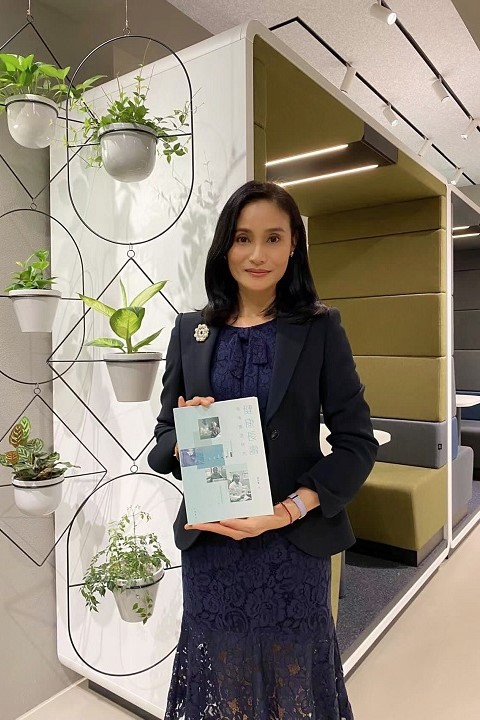Recipient of Sir Edward Youde Memorial Fellowships in 1999/2000 & 2000/2001
尤德爵士紀念基金研究生獎學金1999/2000 及 2000/2001年得獎者
In today’s society, everyone pursues “winning at the starting line”, values background and innate advantages. But in fact, many leaders came from the grassroots, not limited by their personal background. From failing public examination to being awarded with the European Commission’s fellowship to conduct post-doctoral research in Europe, the recipient of Sir Edward Youde Memorial Fellowships in 1999/2000 & 2000/2001, Dr. Karen Cheung grew up in a poor family, Currently, she is the fellow in Sau Po Centre on Ageing at the University of Hong Kong, the director of Mindlink Research Centre and the member of Service Development and Management Committee in The Boys’ and Girls’ Clubs Association of Hong Kong. She has always believed that education has the power to change one’s destiny. Apart from educating people in terms of knowledge and skills, she hopes to push forward a “benevolence-oriented” whole-person education. This drives her evidence-based research at a later stage contributing to societal development.
Dr. Cheung honestly said that when she was a child, her family environment was very poor, and her parents worked hard to earn money to support the family, just like most Hong Kong families at that time. Although her parents had no chance to go to school, they often urged her to keep improving, use knowledge to change her own destiny, do something valuable for society and serve the people. When she was in school, both her parents needed to go out to work and she took on the heavy responsibility of household chores. After graduating from secondary school, her examination results were not enough for her to continue her studies, but during this period she insisted on retaking the exam and improving English, and was finally admitted to an overseas university. Unluckily, her father was diagnosed with cancer when she was studying for her bachelor’s degree in Australia; she had to withdraw from her study and returned to Hong Kong to work and to take care of her father. Inspired by the experience of taking care of his father’s illness and gradual loss of self-care independence, Dr. Cheung went to pursue a master’s program at the Hong Kong University of Science and Technology (HKUST) in the late 1990s. After that, she was awarded studentships to study PhD. During the period, she received funding from the Croucher Foundation to conduct academic exchanges in France, focusing on demographic issues, such as population aging, healthy lifespan, mortality models, life tables, fertility and family policies, population interactions between Mainland China and Hong Kong SAR, etc. Her doctoral dissertation focuses on the limit of human lifespan.
After completing her PhD in 2003, Dr. Cheung was awarded a post-doctoral fellowship from the European Commission, allowing her to conduct population-related research in European countries. She also moved from studying life limits to focusing more research on healthy lifespan and the determinants of healthy longevity. She successively went to the Department of Demography, University of Rome “La Sapeinza” in Italy, the Institute of Social and Preventive Medicine of the University of Lausanne in Switzerland, the National Institute of Health and Medical Research in France, and the Max Planck Institute for Population Research in Germany. She attended numerous international academic conferences and exchanged views with experts all around the world.
Returning from Europe, she served as a research assistant professor in the Department of Social Work and Social Administration at the University of Hong Kong (HKU) in 2009-2012 and an honorary assistant professor in 2012-2017. During her time in HKU, she and the team were invited by the founder of Charles K. Kao Foundation, Mrs. Gwen Kao, to start a non-pharmaceutical intervention counseling service for families with dementia for the first time in Hong Kong, named “Reaching out Dementia Caregiver Support Project (REACH-HK).” With the collective efforts of the Foundation, HKU, the Hong Kong Council of Social Service, the funders and 11 NGOs, they provided support to 500 families with dementia patients in Hong Kong through systematic health assessment and the multicomponent and individualized intervention counseling services that can effectively improve the depression and burden symptoms of caregivers, help relieve caregivers’ emotions and stress, improve the physical and mental health of caregivers, and also help improve the quality of care. Counselling services include providing community support information, care skills, home safety, physical health, caregivers’ mental health and social support, and teaching them to use music, signal breath, exercise, writing up stress diaries and pleasant events to relieve stress, and teaching the caregivers to use the Cognitive Behavioral Therapy to help them manage mental behavioral problems of care recipients and use weekly records to keep track of behavioral changes. Summarizing this research work, they published the results of the evidence-based intervention program in several international academic journals. From 2018 to 2020, her team also developed and piloted the SMART version of the “REACH-HK”. She hopes that the “REACH-HK” project and its SMART version can be widely used by dementia family caregivers in Hong Kong in the coming future.
Recently, Dr. Cheung launched a new book “Healthy Longevity: Evidenced-based Study of Hong Kong”, echoing her past post-doctoral research on health and longevity and the findings from the first phase of “Hong Kong Centenarians Study” at HKU in 2011. With her past scientific research projects, literature reviews and experience of doing field research in Hong Kong’s 18 districts and some well-known longevity regions in search for the myth of longevity, the secrets behind having healthy longevity were unveiled. She hopes that the book can be an insight for Hong Kong to provide feasible solutions for the upcoming “Silver Tsunami” and “Longevity Crisis”.
Dr. Cheung was awarded the Sir Edward Youde Memorial Fellowships for Postgraduate in 1999/2000 and 2000/2001. At that time, she was recommended by Professor Edward Tu Jow Ching, her PhD supervisor of HKUST, and was interviewed by Professor Joseph Sung and other interviewers during the selection process. The scholarship is of great significance to Dr. Cheung. Firstly, after winning the award, Dr. Cheung used the scholarship to participate in RAND for the Summer Institute and the Mini-Medical School for Social Scientists in the United States. The RAND also awarded Dr. Cheung a scholarship together with a chance to attend a dementia-related conference which widened her horizon to study population health and dementia care. Secondly, she was inspired by the SEYMF. In 2013, she and her husband, Mr. Joe Ma Tak Chung, established a HKU COA JMK dementia care and research scholarship at HKU to support postgraduate students in the field of research on dementia caregiving.
After receiving the award for 20 years, in addition to academic research, Dr. Cheung has also been committed to translational research, that is, to transform theoretical research results into practical applications to society. Recently, she cooperated with Yan Chai Hospital (Social Service) to carry out the “Compassionate Love Health Education” pilot project to provide diversified, personalized and practical holistic health and life education intervention services for middle-aged and elders with psychosomatic symptoms. The intervention includes health risk management, whole food plant-based diet, exercise, positive psychology, meditation, and social and spiritual support. From studying demography, to studying healthy longevity, to dementia care support and holistic health and life education intervention projects. Dr. Cheung firmly believes that there is no royal road to learning, and even more humbly says that with her own experience, she tells everyone that “success should not be limited by the starting line”. She also encourages younger generations to equip themselves well at all times so that they can plan for the best and prepare for the worst in the ever-changing world.
現今社會人人追捧「贏在起跑綫」,看重背景和先天優勢。但事實上不少領袖人物出身草根,不以個人背景為限。尤德爵士紀念基金研究生獎學金1999/2000 及 2000/2001年得獎者張筱蘭博士在清貧家庭中長大,試過從升學考試失敗,到取得博士學位,期間兩次成為尤德爵士紀念基金研究生獎學金得獎者。博士畢業後,她更獲取歐洲聯盟委員會的獎學金,到歐洲進行博士後研究工作。現任香港大學秀圃老年研究中心院士、匯智研究中心總監及香港小童群會服務發展及管理委員會委員。她一直相信教育改變命運,但除了知識及技能上的教育以外,她更希望推動以「以仁為本」的全人教育,藉此將往後的實證研究幫助社會發展。
張博士直言小時候家中環境非常清貧,雙親辛勞掙錢養家活口,如同當時絕大部分的香港家庭。雖然父母沒有上過學,但他們經常叮囑要自強不息,用知識改變自己的命運,為社會做點有價值的事及服務人群。求學時期,因雙親都需要外出工作而負起打理家務的重任。中學畢業後,會考成績未足以讓她直接升學,但在該段期間她堅持半工讀重考以及進修英文,最終獲得一家海外大學錄取。不幸地,張博士的父親在她在澳洲攻讀本科學位期間確診患上肺癌,因此她終止學業,回到香港工作及照顧父親。受到照顧患病和漸漸失去自理能力父親的經歷所啓發,張博士在90年代末到香港科技大學攻讀碩士課程,之後更再接再勵獲取助學金讀取博士學位,期間更獲得「裘槎基金會」資助到法國做學術交流,主攻人口學議題,如人口老化、健康壽命、死亡模型、生命表、生育及家庭政策、中港人口互動等,而她的博士論文主要研究人類的壽命極限。
2003年博士畢業後,她榮獲歐洲聯盟委員會的博士後研究生獎學金,讓她到歐洲各國進行人口相關研究,她亦由研究壽命極限轉型至更專注研究健康壽命及健康長壽保護因素。她先後到意大利羅馬大學人口學系、瑞士洛桑大學社會和預防醫學研究所、法國國立衛生與醫學研究所、德國馬克斯普朗克人口研究所等院校深造,參與不同的國際學術會議並與世界各地的專家交流。
從歐洲回流,2009-2012年她在香港大學社會工作及社會行政學系擔任研究助理教授,及後2012-2017年成為名譽助理教授。任內,她和團隊受到高錕慈善基金創辦人高黃美芸女士的邀請,在香港首次推出非藥物治療的輔導服務給予患有認知障礙症的家庭, 名為【「腦」伴同行】計劃。在高錕慈善基金、香港大學、香港社會服務聯會、資助單位以及11間的社福機構的鼎力合作下,為全港500個認知障礙症患者的家庭提供支援,透過有系統的健康評估及多元化的介入輔導服務,有效改善照顧者的抑鬱症狀和負擔症狀,有助舒緩照顧者的情緒和壓力,改善照顧者的身心健康,亦有助提升照顧質素。輔導服務內容包括提供社區支援資訊、照顧技巧、家居安全、身體健康、照顧者精神健康及社交支援,並教導他們利用音樂、深呼吸、運動、撰寫壓力日記及快樂事件等形式舒緩壓力,以及教授照顧者運用認知行為治療的方法,幫助他們處理患者的心理行為問題,並使用每週記錄來跟踪行為改變。總結這次研究工作,她們把整個以實證為本介入計劃的成果和得著發佈於數份國際學術期刊。2018-2020年,她與團隊更研發智能應用版的【「腦」伴同行】,並完成試點;未來她希望【「腦」伴同行】計劃及智能應用版能給予照顧者廣泛使用。
最近,張博士推出新書《健康長壽:香港實證研究》,呼應她在過去博士後有關健康長壽的研究及2011年她在港大進行的第一期【香港百歲老人研究】的成果。結合過往在不同領域的科學研究和文獻成果,加上在香港18區以及一些著名的長壽地區進行實地考察,歸納出健康長壽的秘密,希望以此為依據為香港即將面對的「高齡海嘯」和「長壽危機」提供可行之策。
張博士在1999/2000 及 2000/2001年獲頒尤德爵士紀念基金研究生獎學金。當時,她獲得科技大學的恩師涂肇慶教授的推薦,並在面試階段跟包括沈祖堯教授等面試官對答。獎學金對張博士來說意義重大,一來是張博士在獲獎後利用獎學金參加美國蘭德醫學院和社會科學暑期研究所課程,學院更同時頒發張博士獎學金給她出席有關認知障礙症的會議,為她敞開了研究人口健康及認知障礙症照顧的大門;二來是她受獎學金的啟發,在2013年她與丈夫馬德鐘先生的瓷婚周年在香港大學秀圃老年研究中心成立以二人命名的獎學金,以支持研究生對認知障礙症照顧的研究工作。
得獎20年,張博士在學術研究以外,亦一直致力於轉譯研究,即是把理論研究成果轉化為實際應用到社會上。最近,她與仁濟醫院 (社會服務) 合作進行【仁濟慈愛健康教育】先導計劃,為具身心症中年人士及長者提供多元化、個人化及實務的全人健康生命教育介入服務,包括健康風險管理、整全植物飲食、運動、正向心理、靜坐、社交及靈性方面的支援。從攻讀人口學,到研究健康長壽,再到認知障礙症照顧支援及全人健康生命教育的項目。張博士堅信學海無涯,更謙稱以自身的經歷來告訴大家「成功不應受起跑綫所限」,並鼓勵後輩要時刻好好裝備自己,才能在不斷變遷的世界中做最好的準備和最壞的打算。

